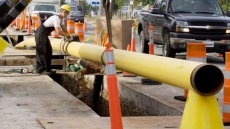OTTAWA — The federal Liberal government is spending $4.5 billion to buy Trans Mountain and all of Kinder Morgan Canada's core assets, Finance Minister Bill Morneau said Tuesday as he unveiled the government's long-awaited, big-budget strategy to save the plan to expand the oilsands pipeline.
In return, Kinder Morgan will go ahead with its original plan to twin the pipeline this summer while the sale is finalized, which likely won't happen until August, Morneau told a news conference in Ottawa.
Once the sale is complete, he said, Canada will continue the construction on its own, with a view to eventually selling the whole thing down the road, once market conditions would allow it to get the best price.
Today, we’ve taken action to create & protect jobs in Alberta and BC, and restart construction on the TMX pipeline expansion, a vital project in the national interest. Watch Ministers @Bill_Morneau and @jimcarr_wpg: https://t.co/cgAn3lH8jq
— Justin Trudeau (@JustinTrudeau) May 29, 2018
Morneau presented the options during an early-morning cabinet meeting Tuesday before ministers signed off on the chosen option, which comes just days before the company's self-imposed May 31 deadline and is still subject to the approval of Kinder Morgan shareholders.
"We believe this is the best way to protect thousands of well-paying jobs and the safest and most effective way to get our resources to world markets," Morneau told a news conference in Ottawa after the meeting, Natural Resources Minister Jim Carr at his side.
"Make no mistake: this is an investment in Canada's future."
Pressed about why the federal government's $4.5-billion price tag was so much lower than Kinder Morgan's stated $7.4-billion project value, Morneau said Ottawa was purchasing all the relevant assets — but he studiously avoided saying whether construction would increase costs.
We are able to pursue this project with confidence, because we know that we are upholding the trust Canadians have placed in us to both grow our economy and protect our environment. 2/2
— Bill Morneau (@Bill_Morneau) May 29, 2018
"We are purchasing the assets; we are purchasing the existing assets, and the investment in the twinning of that pipeline, and those assets are what is required for us to move forward with the expansion," he said.
"It allows us to move forward with the investments required to get the expansion completed and delivering the value that we know it can deliver to the Canadian economy."
He hinted, however, that there would be additional costs, to be defrayed by the revenue generated by the pipeline itself.
"It creates effectively a toll, a user-pay, to be paid by the oil companies. So the additional investments will be dealt with in that way," Morneau said.
Today @JimCarr_WPG and I announced that we have reached an agreement that will get TMX built, guarantee the summer construction season and protect thousands of jobs. 1/2 pic.twitter.com/RGASrKgWjH
— Bill Morneau (@Bill_Morneau) May 29, 2018
"This is a project that will not have a fiscal impact. When you're making an investment, you're buying an asset, and that is something that goes on the balance sheet. So there is no fiscal hit with this purchase."
Export Development Canada will finance the purchase, which includes the pipeline, pumping stations and rights of way along the route between Edmonton and Vancouver, as well as the marine terminal in Burnaby, B.C., where oil is loaded onto tankers for export.
Morneau said the federal government does not plan to be a long-term owner and is in negotiations with interested investors, including Indigenous communities, pension funds and the Alberta government, which will provide funding for any unexpected costs that arise during construction.
The Canadian government is spending $4.5B to buy Kinder Morgan's Trans Mountain pipeline. https://t.co/TIuWI4GODh
— Twitter Moments Canada (@CanadaMoments) May 29, 2018
"To investors considering Canada as a place to build big, important, transformative projects like the Trans Mountain expansion, we want you to know that you have a partner in Ottawa," Morneau said.
"One who not only respects the rule of law, but who understands the challenges you are up against and will work with you to find solutions that work for everyone."
Alberta Premier Rachel Notley cheered the news on Twitter.
This is a major step forward for all Canadians.
— Rachel Notley (@RachelNotley) May 29, 2018
We have met the deadline.
This project has more certainty than ever before.
We won’t stop until the job is done!
I’ll have more to say later this morning. #KeepCanadaWorking #ABleg #ABpoli #TMX
The deal announced today puts people to work building the pipeline right away and it will help us build up the things that matter to working families, such as our schools and our hospitals.
— Rachel Notley (@RachelNotley) May 29, 2018
We won’t stop until the job is done. #KeepCanadaWorking #ABleg #ABpoli #Cdnpoli pic.twitter.com/0L8B6jcqPH
Good jobs & meaningful climate action can, & must, go hand in hand.
— Rachel Notley (@RachelNotley) May 29, 2018
Any climate change plan that ignores the needs of working people is doomed to fail.
And any economic plan that ignores climate change is setting our businesses, our kids and future generations up to fail. #ableg
"This is a major step forward for all Canadians. We have met the deadline," she tweeted. "This project has more certainty than ever before. We won't stop until the job is done!"
The plan — similar to how Canada financed and managed shares in General Motors and Chrysler in 2009 during the financial crisis — will include a new Crown corporation to manage the project.
The deal brings some certainty to an expansion project that has been on the rocks ever since B.C. went to court in hopes of blocking it, fearing the impact of a spill of diluted bitumen, the raw output from Alberta's oilsands.
Steve Kean, chairman and chief executive of Kinder Morgan Canada Ltd., said the deal represents the best opportunity to complete the expansion project.
"We've agreed to a fair price for our shareholders and we've found a way forward for this national interest project," he told a conference call with financial analysts.
Ottawa has the constitutional authority to build interprovincial projects like pipelines, but B.C. Premier John Horgan has gone to court to get a judge to weigh in on whether B.C.'s jurisdiction for the environment would allow him to regulate what flows through the pipeline.
The ensuing uncertainty, paired with vociferous opposition from environmental groups and some Indigenous communities in B.C., prompted Kinder Morgan to halt investment until the federal government could inject some certainty into the project.
"The previous government spent 10 years pitting the environment and the economy against each other; they pitted us against each other. It polarized us. That is not who we are," Carr told the news conference.
"The majority of Canadians support this project. The majority of Canadians understand that we are in a transition to a clean-growth century, and we will not get there overnight. But we will get there."
Ottawa is pressing ahead, firmly of the opinion there is no doubt about its jurisdiction. It is also confident it will prevail in a Federal Court challenge by some Indigenous communities over its approval of the pipeline, a ruling on which is due any day.
BREAKING: Federal government to buy Trans Mountain pipeline, all of Kinder Morgan Canada's core assets for $4.5 billion. #cdnpoli pic.twitter.com/AGzaFn3lJI
— Globalnews.ca (@globalnews) May 29, 2018
A Finance Department official says that as a Crown project in the national interest, Canada has special allowances to proceed that may not be available to a private-sector company.
Canada approved the project in November 2016, following an expanded environmental review process that included additional consultations with Indigenous communities and assessing the amount of additional emissions likely to result from additional production.
Prime Minister Justin Trudeau has long insisted the project is in Canada's national interest and is a pivotal part of the country's economic future.
Canada loses $15 billion every year on the sale of oil because the U.S. remains its only export customer, resulting in a lower price, Trudeau argues. A lack of capacity in pipelines or in rail cars to ship oil produced in Alberta is also hurting Canada's energy sector.
Trudeau arbitrarily cancelled the Northern Gateway pipeline. His new regulations led to Energy East pipeline cancellation. Today, the Liberals are forced to buy Trans Mountain because the private sector has no confidence in the Liberal government. #cdnpoli
— Erin O'Toole (@ErinOTooleMP) May 29, 2018
FIVE THINGS: THE NEXT STEPS FOR GETTING THE TRANS MOUNTAIN PROJECT DONE
OTTAWA — The federal government announced a plan Tuesday to spend $4.5 billion on buying the Trans Mountain pipeline and most of current owner Kinder Morgan Canada's other assets in order to ensure a plan to twin the pipeline is allowed to proceed. Here are five things that have to happen next:
1. Shopping for a buyer. Kinder Morgan Canada and the federal government will spend the next eight weeks jointly trying to find another buyer for the pipeline. Kinder Morgan has agreed to take part in marketing the project; Ottawa wants to avoid becoming a pipeline owner if at all possible.
The federal government has announced they'll be purchasing the Trans Mountain Pipeline for $4.5 billion. This is a travesty. Taxpayers should not be liable for this government's failure to get TMX built. #TransMountain #cdnpoli
— Shannon Stubbs (@ShannonStubbsMP) May 29, 2018
2. Beginning construction. Kinder Morgan is going to start construction on the pipeline as planned this summer, with Ottawa providing loan guarantees for any money the company spends on the endeavour between now and when the pipeline is sold. Construction costs going forward will be included in the $4.5-billion sale price if no buyer is found.
3. Seeking shareholder approval. If no new buyer is reached by July 22, Kinder Morgan will present the $4.5 billion offer from Canada to its shareholders for a vote before the end of July. If shareholders approve the sale, the paperwork will be completed sometime in August or September.
The purchase will see Canada buy the existing pipeline, the Westridge marine terminal in Burnaby, B.C., as well as pumping stations and rights of way along the routes. If Canada buys the pipeline, it will also acquire the personnel needed to continue with construction. That would be several hundred people ranging from executives and managers to construction employees.
4. Setting up a new Crown corporation. The Export Development Bank of Canada will finance the plan and create a Crown corporation to run and manage the pipeline during Canada's ownership period.
The crown will use the expertise and management of the employees acquired from Kinder Morgan to get the pipeline built. Finance Minister Bill Morneau believes Canada's authority to build the pipeline will be able to overcome any resistance, be it from protesters or the B.C. government.
Today Justin Trudeau admitted failure to Canadian energy workers over his Trans Mountain debacle. Watch my response to his failure live: https://t.co/fjdAI7fhwL
— Andrew Scheer (@AndrewScheer) May 29, 2018
5. Watching for future investors. During or following construction of the expanded pipeline, which is expected to take about 2.5 years to complete, Canada will monitor the markets and seek out future investors interested in taking on the entire project once it is done.
Canada's long-term plan is to finance the costs of construction through the paid contracts with oil producers to ship their oil through the pipeline, and recoup its investment through an eventual sale.
DEAL BY KINDER MORGAN CANADA TO SELL TRANS MOUNTAIN WELCOMED WITH MISGIVINGS
The Canadian pipeline industry welcomed news Tuesday that the Trans Mountain expansion pipeline is more likely to be built, but expressed grave misgivings over the federal government's decision to buy both the expansion and the existing line in order to achieve that goal.
Canada needs projects like the expansion designed to triple Trans Mountain's capacity to move crude oil and refined products from the Alberta oilsands and Edmonton refining complex to the West Coast, said Chris Bloomer, CEO of the Canadian Energy Pipeline Association.
But he added in a statement that the association is "deeply concerned" that the government felt it had to purchase the project "to assert federal jurisdiction" and allow it to be built.
"(The expansion project) went through extraordinary reviews and was approved by the government of Canada 18 months ago," he said.
"The project has always been in the national interest. CEPA is concerned about the implications of the government's financial intervention for future transmission pipeline projects. We do not believe that this outcome will instill investor confidence in Canada."
.@JustinTrudeau’s Minister of Finance just announced that he will nationalize a pipeline project that he himself put in jeopardy with his disastrous energy policies. Statism is not the solution to the Trans Mountain crisis, it’s the problem! #cdnpoli
— Maxime Bernier (@MaximeBernier) May 29, 2018
Kinder Morgan Canada Ltd.'s shares lurched higher, then fell, after the federal government announced early Tuesday it would buy its Trans Mountain pipeline assets for $4.5 billion.
The stock rose to $18 in early trading on the Toronto Stock Exchange but fell back to $16.58, down a penny, by 11:40 a.m. ET. The company's stock had been halted prior to the announcement.
The Canadian company estimated the deal is worth about $12 per restricted voting share, after capital gains tax. It expects its approximately 30 per cent share of after-tax proceeds to be about $1.25 billion.
"This is a great day for Canada, for our customers, for our employees," Kinder Morgan Canada CEO Steve Kean said on a morning conference call. "We've agreed to a fair price for our shareholders and found a way forward for this national interest project."
He said his company had agreed to work with the government to try to find a third party to buy the assets by July 22. Kean is also CEO of Kinder Morgan, Inc., the Houston-based firm that owns 70 per cent of the Canadian firm.
Kinder Morgan Canada will continue to hold an integrated network of crude tank storage and rail terminals in Alberta, the company said. It will also own a terminal in Vancouver and the Cochin Pipeline system which transports light condensate from the United States to Fort Saskatchewan, just northeast of Edmonton.
It's gonna take decades to collect $7.4 billion to finance the Trans Mountain expansion pipeline from tolls collected from oil exporters using the much smaller existing pipeline. Not sure how Morneau can suggest there's no fiscal hit on the government bottom line.
— Don Martin (@DonMartinCTV) May 29, 2018
The company had ceased all non-essential spending on the Trans Mountain expansion in April, vowing to cancel it unless it received assurances it can proceed without delays and without undue risk to shareholders by a deadline of this Thursday.
After the federal government's announcement, Kean said the work would be restarted soon, with the government funding construction. The sale is expected to close in the second half of the year.
News that the federal government is buying the pipeline surprised Martin Tallett, president of Massachusetts-based oil market research firm EnSys Energy.
🔊 "It doesn't matter who owns the pipeline... it's about the potential negative consequences" - B.C. Premier @jjhorgan speaking on @CKNW.https://t.co/NfadR3Jjlf #bcpoli #KinderMorgan #cdnpoli #TransMountain #abpoli #tmx
— John O'Dowd (@JohnODowdIRL) May 29, 2018
"It's really quite a turnup for the books for the Canadian government to buy itself a pipeline," he said.
"If you think about the dozens of pipelines that exist for crude oil, natural gas liquids, natural gas itself, petroleum products, all throughout the U.S. and Canada — and we track this stuff — I'm not aware of a single one that's owned by any government entity ... not on this scale."
He said the failure of the proposed Northern Gateway pipeline to the West Coast and Energy East pipeline project to the East Coast means Canada remains highly dependent on the U.S. market for exports. He said the Trans Mountain expansion is needed for increased access to other markets.
Here's the big question we need answered: Does the government believe there is something inherent in nationalizing Trans Mountain that makes it easier to complete than when it was privately held? #cdnpoli
— Anthony Furey (@anthonyfurey) May 29, 2018
"We've always reckoned that the Trans Mountain expansion was logical in terms of, if you build the pipeline, the volumes will flow through it. I think that's been reinforced by the fact that Kinder Morgan was able to build up through different open seasons to a high level of commitment (from shippers)," he said.
"There will be quite a lot of that crude going to northeast Asia, which is quite a short distance by sea."
He said the only major government-owned pipelines he knows of in the world exist in countries like China, Saudi Arabia or Kuwait, where the pipeline is operated by a subsidiary of a national oil company.
TIMELINE: KEY DATES IN THE HISTORY OF THE TRANS MOUNTAIN PIPELINE
Here are some key dates in the history of the Trans Mountain pipeline and Kinder Morgan Canada's efforts to expand its capacity:
October 1953: The Trans Mountain pipeline begins shipping oil with an initial capacity of 150,000 barrels per day. The project features four pump stations along its 1,150-kilometre route and a marine dock that connects loading facilities on the east side of Edmonton with ocean tankers in Burnaby, B.C.
Agreement Reached to Create and Protect Jobs, Build Trans Mountain Expansion Project https://t.co/h0JwuTvig1
— FinanceCanada (@FinanceCanada) May 29, 2018
1957: Pipeline capacity is expanded via the construction of a 160-kilometre pipeline loop. The Westridge Marine Terminal is built and commissioned in Burnaby, B.C.
Jan. 14, 1985: Trans Mountain's biggest spill occurs at a tank farm in the Edmonton area. Nearly 10,000 barrels of oil are released.
2006 - 2008: The Anchor Loop project adds 160 kilometres of new pipeline through Jasper National Park and Mount Robson Provincial Park between Hinton, Alta., and Hargreaves, B.C. The extension includes 13 new pump stations and modifications to existing stations, increasing capacity from 260,000 bpd to 300,000 bpd.
Feb. 21, 2012: Kinder Morgan says it wants to expand the Trans Mountain pipeline after receiving support from oil shippers and will begin public consultations.
Dec. 16, 2013: An application is made to the National Energy Board (NEB) to expand the Trans Mountain pipeline. Construction is proposed to begin in 2017, with the aim of having oil flow through the expansion by December 2019.
November 2014: More than 100 people are arrested after they camp out in a conservation area on Burnaby Mountain, east of Vancouver, to block crews from conducting drilling and survey work related to the pipeline expansion. Most of the charges are later dropped.
August 2015: The NEB postpones public hearings after striking from the record economic evidence prepared by a Kinder Morgan consultant who was to begin working for the regulator.
Andrew Scheer on federal govt's announcement that it will buy Trans Mountain pipeline:
— CPAC (@CPAC_TV) May 29, 2018
"$4.5B is the absolute minimum of taxpayers' money that's going to be on the hook here. Justin Trudeau can't tell us the true cost on this & he's asking Cdns to bail him out of his failure." pic.twitter.com/K1uP5vJgie
Jan. 12, 2016: Alberta Premier Rachel Notley says in a written submission to the NEB that the Trans Mountain pipeline expansion is in the best interests of both Alberta and Canada.
Jan. 27, 2016: The federal Liberal government says pipeline projects such as the Trans Mountain expansion will now be assessed in part on the greenhouse gas emissions produced in the extraction and processing of the oil they carry. Proponents will also be required to improve consultations with First Nations.
May 17, 2016: Ottawa appoints a three-member panel to conduct an environmental review of the Trans Mountain expansion project.
May 29, 2016: The NEB recommends approval of the pipeline, subject to 157 conditions, concluding that it is in the public interest.
Nov. 29, 2016: Prime Minister Justin Trudeau sanctions the Trans Mountain expansion, part of a sweeping announcement that also saw approval of Enbridge's Line 3 pipeline replacement but the end of its Northern Gateway project.
Jan. 11, 2017: B.C. Premier Christy Clark announces her support for the project, saying Kinder Morgan has met five government conditions including a revenue-sharing agreement worth up to $1 billion.
May 15, 2017: The Federal Court of Appeal grants Notley's government intervener status in a lawsuit filed by municipalities and First Nations against the project.
It’s all nice and well that Canada bought the whole Trans Mountain project, but Federal Court of Appeal can still cancel the new pipeline approval shortly because of inadequate First Nations consultation.
— Jason Markusoff (@markusoff) May 29, 2018
May 25, 2017: Kinder Morgan makes its final investment decision to proceed with the development, now estimated to cost $7.4 billion, subject to the successful public offering of Kinder Morgan Canada.
May 29, 2017: The B.C. NDP and Greens agree to form a coalition to topple the Liberal party, which won a minority government in an election earlier in the month. The parties agree to ``immediately employ every tool available'' to stop the project.
May 30, 2017: Kinder Morgan Canada debuts on the Toronto Stock Exchange after a $1.75-billion public offering.
June 29, 2017: The B.C. Liberals lose a no-confidence vote, clearing the way for NDP Leader John Horgan to become premier.
Aug. 10, 2017: The B.C. NDP government hires former judge Thomas Berger to provide legal advice as it seeks intervener status in the legal challenges against the project filed by municipalities and First Nations.
Oct. 26, 2017: Kinder Morgan Canada asks NEB to allow work to begin despite a failure to obtain municipal permits from the City of Burnaby.
Dec. 7, 2017: NEB allows Kinder Morgan Canada to bypass Burnaby bylaws.
Jan. 17, 2018: Kinder Morgan Canada warns the Trans Mountain expansion project could be a year behind schedule.
Jan. 18, 2018: NEB establishes a process to resolve permitting issues between Kinder Morgan Canada and provincial and municipal authorities.
My statement on #KinderMorgan: pic.twitter.com/vGuHHp70v7
— Perry Bellegarde (@perrybellegarde) May 29, 2018
Jan. 30, 2018: B.C. government moves to restrict any increase in diluted bitumen shipments until it conducts more spill response studies, a move that increases the uncertainty for Trans Mountain.
March 9, 2018: B.C. Supreme Court grants interim injunction aimed at preventing anti-pipeline activists from protesting construction at two terminals in Burnaby.
March 15, 2018: B.C. Supreme Court grants indefinite injunction preventing protesters from coming within five metres of two work sites for the project.
March 23, 2018: Green Party Leader Elizabeth May and New Democrat MP Kennedy Stewart arrested at a protest against the pipeline expansion; Federal Court of Appeal dismisses a B.C. government bid challenging a NEB ruling that allows Kinder Morgan Canada to bypass local bylaws.
March 27, 2018: City of Burnaby, B.C., says it will file an appeal to the Supreme Court in connection with the Federal Court of Appeal ruling.
April 8, 2018: Kinder Morgan Canada suspends non-essential spending on the Trans Mountain expansion project and sets a May 31 deadline to reach agreements with stakeholders.
May 29, 2018: Federal government announces deal to buy the Trans Mountain pipeline and expansion project from Kinder Morgan Canada for $4.5 billion.





